- Home
- Nick Carter
Earthfire North Page 2
Earthfire North Read online
Page 2
The door opening onto the catwalk flew open with a bang, and the light went on. To her horror, she saw a line of footprints in the dust leading from the bottom of the stairs to where she hid. She bit her tongue to keep from crying out.
He came down the stairs like a hunter stalking his prey, stopping every few feet to cock his head as if he were listening for something. She caught a glimpse of him through the tangle of pipes. He wore mechanic's overalls, and a huge black revolver rode in his right hand.
Now she'd done it, she chided herself. The scientist with the international reputation, with the right to look around if she saw something suspicious, was in a jam.
He'd found the footprints and was looking in her direction. Instinctively she cowered lower into her tiny refuge and felt her foot wedge between two pipes.
He came slowly toward where she was hiding, and their eyes met. He brought the pistol up, then came the rest of the way around the pipe.
"I guess you found me," she said, raising her hands over her head and trying to stand. But her foot was wedged solidly, and she fell forward.
He fired.
A vicious clang resounded through the room. Then a hissing sound quickly rose to a scream as white-hot steam blasted somewhere behind her. She screamed in pain as she pulled frantically at her foot, but it refused to move. The steam increased, billowing around her now, and the pain became suddenly more than she could bear, and she knew that she was going to die here, watched by the man in the mechanic's overalls.
Her back was searing… she was being scalded alive.
"Help me…"she tried to scream, but the words died in her throat. Darkness was overtaking her. It welled up from somewhere below, finally swallowing her.
One
As the wheels of Nick Carter's plane bumped down on the runway at Keflavik International Airport outside Reykjavik, he looked out the window at the barren, seemingly moonlike landscape and shook his head. It was nearly impossible to believe that Lydia was dead. And here, of all places.
As he made his way in line with the other passengers across the tarmac to the terminal, he got a good look at the low, featureless hills that seemed to meld into the horizon, into the low-slung, featureless sky. She had probably been happy here, with the fumaroles and lava beds and glaciers. At least she'd died working.
He collected his bag, had it checked by a perfunctory customs officer, then carried it the block or so to the airport bus terminal. The bus came promptly, a modern affair with tall, bus-tour type windows, and as he settled into his seat, the blank sky and the rocky barrenness of Iceland seemed to bear down on him. If it weren't a fit place to die, it certainly was a suitable place to mourn. The entire landscape seemed to be in mourning.
He and Lydia had been friends for several years, though it hadn't begun that way. It had started as just another conquest. A quick, easy seduction to see what came up, like a roll of the dice. It had been after a particularly difficult assignment, and he had not been himself. He had been short-tempered, cooly arrogant, and definitely, to use her words, a bastard.
She'd Iain awake that night long after they'd finished, while he slept fitfully. About dawn he felt her smooth, warm body nestle against his, and he responded to her, but she held him off.
"Don't." she said.
"What's the matter?"
"Just hold me."
"I don't know you well enough for that," he had said, or something equally as lousy, and she had begun to cry. He studied her face in the early-morning light, and a rising pity for her was mixed with anger at himself for the cruelty of what he had just said and thoughts about AXE, the highly secret intelligence agency for which he worked. He was an agent. Killmaster, N3… licensed to kill, just like in the James Bond novels, but for real. He also thought about the many roles he had to play, including, occasionally, that of assassin. It was the pressure, he told himself. Nothing more.
"I'm sorry," he said.
"You're a bastard."
That was that, he had thought. He had fully expected her to get up, get dressed, and leave then and there. But to his surprise her fingertips trailed softly across his shoulder blades.
"We… we can make love again… if you'd like, Nick."
When they had first met, he had seen a bored scientist who had given to him the holier-than-thou routine. She was above him, but she might consent to perhaps make love. She was slumming. But now he knew he had been mistaken. As he looked into her eyes, he saw something else, something much more honest and infinitely more dangerous.
"I love your body," she murmured softly, running her hand down his collarbone and across the stiff, hard shell of the scar from an old bullet wound.
He kissed her then, long and full, and for the first time something buried deep inside her came to life, and she clung to him as if she never wanted to let him go.
"Oh…God, "she moaned, her fingernails digging into his back.
"It's all right, Lydia," Carter whispered, and after a long time she began to relax, and she laid back, her eyes moist.
He kissed her breasts, then, the nipples erect, and worked his way slowly down to her flat stomach, and the small tuft of pubic hair as she spread her legs for him.
"Nick," she whimpered, holding his head between her hands, her hips gyrating.
He rose up, kissing her breasts as he entered her, and soon they were making slow, gentle love, her body coming up to meet his thrusts. And it was good. Much better than it had been for Carter for a very long time.
After that night and morning together they had gone their separate ways: he to Peru to take care of a Communist guerrilla defection the CIA was on the verge of mishandling; and she to the mountains of Montana to study igneous rock formations. But she had written from time to time. Timidly at first, a line or two, just to let him know she was alive and well, then longer letters, more of herself, but always careful never to infringe on him… never to ask questions.
They met again in Washington. He was on leave between assignments, and she had returned to write a grant for George Washington University. They dined in Georgetown, attended a concert at the Kennedy Center, then checked into the Watergate for a night of champagne and lovemaking that culminated at the rooftop pool at about five that morning.
It was while sitting there, dangling his feet in the tepid water, watching her absolutely perfect form break the surface then dip again beneath the moon-jeweled wavelets, that he wondered if AXE could do without him for a few years, and if he could do without AXE.
But it wasn't to be. The phone rang the next morning and he'd picked it up, feeling better and more relaxed than he had in years. It was David Hawk, AXE's two-fisted director, with the usual summons. This time to Lahore, where supply lines for the Afghan nationalists were in serious danger of being cut off. They said their good-byes again. She said she understood, although he suspected she didn't. And shortly after that she had accepted the faculty job with the University of Iceland for a year. It was a chance to study the fissures she had talked about. It was to be the last time they would ever see one another.
A month later he'd come back to Washington, the supply lines flowing once again, to be greeted by a very odd piece of mail. A large brown envelope postmarked Iceland with a Thorstein Josepsson, Althing Committee on Internal Affairs, on the return address. Inside was another envelope, this one badly water-damaged, and a letter. The letter spoke in somber tones of regrets and condolences, and told of a freak accident in a geyser field, a foot caught, and a horrible scalding death. She'd been carrying a letter, sealed, stamped but never sent.
Lydia's letter was incendiary. His suspicions burned. What had she found? How did it figure in the local politics? What were the local politics?
He had appealed to Hawk for a week's leave and was offered three days. But Hawk saw the look in his eyes and gave him a no-limit on the time as long as he was willing to be on twenty-four-hour call. He'd agreed, got cash and a ticket on his credit card, and boarded the first flight to Iceland. Now
that he was here, however, in full view of the melancholy sky and the tired sea pounding its worn waves time after time against the shore, he wondered if he hadn't made a mistake. After all, mere was absolutely no reason to suspect she hadn't died exactly as Josepsson had written. Maybe he should have gone to the Caribbean or to the Mediterranean, someplace light and airy where the atmosphere wouldn't contribute to his gloom. He was full of sadness and regrets.
The bus pulled into Austurvollur Square and stopped in front of a building that advertised itself as the Borg Hotel. "Final stop," the driver said through the public-address system. Other buses were lined up outside.
Carter followed the crowd to the front of the bus, then leaned over the driver's seat.
The man looked up at him.
"Tell me about the Althing."
"It's our Parliament. Oldest continuously meeting parliament in the world. Dates back to 930 A.D. Meets over there." The driver indicated a nineteenth-century two-story stone building on the other side of the square.
"Is it in session now?"
"No," the driver said. "It is summer vacation."
"They're all gone then?" Carter asked, looking at the building.
"Some of them remain here. There are offices. There is work to be done."
He thanked the man and got out. A few minutes later he picked his bag up from the sidewalk where the driver had pitched it, then went inside the hotel. They had a room, but it was small and had no view of the harbor. He took it. A bellman carried his suitcase upstairs, and when the young man was finished opening the drapes and closet doors and explaining hotel policy, Carter gave him a folded bill.
"Have you ever heard of Thorstein Josepsson?" he asked.
The bellman looked at the money, then up at Carter. He nodded. "He's a distinguished member of the Althing."
"Where does he live?"
"Here, in town."
"What else do you know about him?"
The bellman hesitated. Carter peeled off another bill and handed it over.
"He likes scotch whiskey, no ice, no water. Usually eats his dinner here in the hotel dining room."
Carter smiled. "What else does he do?"
"Mr. Josepsson is on the board of directors of the Icelandic Internal Energy Commission, and is on the boards of several large businesses."
"Where can I find him?"
"At this moment, sir?"
Carter nodded.
"I believe Mr. Josepsson is downstairs in the dining room."
Carter handed the bellman another bill. "Meet me downstairs in five minutes, and point him out to me."
"Very good, sir."
When the bellman was gone. Carter locked the door and began unpacking with his customary caution. He pulled all the drapes, and when the room was quite dark, he turned on the lights. He checked the walls, outlets, and fixtures for signs of anything unusual. Even though no one knew he was coming up here, this was standard operating procedure. When he found nothing, he put his suitcase on the bed and unlocked it.
From an inside pocket he took out a shoulder holster, the leather of which had been worn dark with use, and he strapped it on. Then he pulled out a radio-cassette player, removed the back, then the main component board. Inside, in a Styrofoam mold, lay Wilhelmina, his 9mm Luger, and below it a silencer. The player had been made by AXE technicians to allow Carter to carry his weapons aboard commercial flights without detection. He pocketed the silencer, then took out the gun and pushed it into the holster.
From inside the suitcase's satin lining he drew out a narrow sheath of chamois leather and a pencil-thin blade with a wickedly sharp point. He strapped the sheath to his forearm under his shirt and inserted the stiletto, years ago nicknamed Hugo. Then he buttoned the shirt over it and put on his jacket. He studied his image in the full-length mirror on the back of the bathroom door. When he was satisfied that none of his weaponry showed, he closed the suitcase and shoved it under the bed, then left, locking the door behind him.
He carried another weapon as well, a gas bomb dubbed Pierre, attached to his leg, high on his right thigh, much like a third testicle. Any other man thus loaded down would have felt like a walking arsenal, but Carter had been dressing this way for a good many years and had had occasion to call on each of his weapons in time of crisis. Consequently, for the first time since leaving Washington, he felt fully secure and ready for anything.
The bellman stepped up to him as he entered the dining room and handed him a folded white card. Carter opened it and found a schematic drawing of the dining room, showing three tables in front of a bay of large windows at the far end of the room. At one of the tables the bellman had made a check mark.
Carter glanced across the room. The man sitting at that position was neither old nor young, but like many Icelanders Carter had seen, he had rugged, rocklike features that seemed to have been borrowed from the landscape. Two other men were seated with him, and they looked decidedly foreign… that is, foreign to Iceland.
Carter reached into his pocket for an additional tip, but the bellman, apparently not interested in being involved any further with the American and his questions, had moved away. Carter shrugged, then went across the room to where Josepsson was seated.
"Mr. Josepsson," Carter said.
The man looked up inquiringly, a bite of fish still in his mouth.
"I am Nick Carter. The addressee of the letter from Dr. Lydia Coatsworth you were kind enough to forward to me."
The man put down his knife and fork, laid his napkin on the table, and rose to shake Carter's hand. "We were terribly saddened, Mr. Carter. You were a close friend of Dr. Coatsworth?"
"Yes, I was."
"I am sorry, truly sorry then."
There was an awkward moment where signals seemed to have gotten crossed, then Carter gave a slight nod, acknowledging the man's expression of sympathy.
"Do you mind if I sit down?" It was pushing things, but Carter wanted to see how Josepsson would react.
Josepsson glanced uncertainly at the other two men who watched from across the table. Carter's request to join them clearly made him uncomfortable, but he had no polite way of refusing.
"Please do," he said at last. "We have an empty place."
Carter drew up a chair, and Josepsson motioned for the waiter.
Carter scanned the menu, and when the waiter arrived, he started to order, but Josepsson cut him off. "Your first visit to our country?" he asked.
Carter nodded.
"Then have the fish. Any fish. It is always best in Iceland."
Carter pointed to an entree with an unpronounceable Icelandic name. The waiter nodded, wrote it down, then gathered up the menu and left.
"May I introduce Herr Hofstaeder and Herr Boorman. Some business associates of mine."
Carter nodded to the two men, and they returned the perfunctory greeting. Hofstaeder looked every inch the typical German in his middle sixties, light-skinned, brown hair light enough to blend in with the gray and make it difficult at first glance to tell his age. His friend, Boorman, however, was another matter. Younger — in his late thirties — his hair was jet black and his skin olive-toned. Streaks of gray had just begun to appear at the temples, giving him a dashing, somewhat Latin look.
"What brings you to Iceland, Mr. Carter?" Josepsson asked without preamble. "I imagine you will want to see the university where Dr. Coatsworth worked, and perhaps travel to the interior to see the accident site. I'm guessing now as to why you have chosen this moment to visit us."
"Did you read her letter?" Carter asked, keeping his voice neutral.
"No. It was sealed. We merely sent it to whom it was addressed. It was a simple administrative matter. You must understand, Mr. Carter, that I did not know Dr. Coatsworth personally."
"She indicated to me, Mr. Josepsson, that she had found something here. Something incredible, she wrote, that would stir up the local politics. Would you have any idea what she could have meant by that?"
For the second tim
e Josepsson looked obviously uncomfortable. He glanced at the other two men, then glanced at his fingernails. "No," he said finally. "I have no idea. You should, perhaps, go to the university. Perhaps they can be of more help."
"I will. But I wanted to make contact with you first, sir. You did send me her letter."
"It is a mystery to me what she may have meant," Josepsson said. He took a drink of water. "But I was the sponsor for the exchange program that brought Dr. Coatsworth to our country. I saw it as my logical duty to forward her letter to you, as well as her personal effects to her family. You must understand."
Carter said nothing; he was thinking again of the last time they had been together.
"I have no knowledge of what she may have discovered that could have had any effect on our politics… though I feel I speak with some authority when I say I cannot imagine what she might have been referring to." Josepsson leaned forward slightly. "You must understand, Mr. Carter, that here in Iceland politics are a good deal more honest and aboveboard than they are anywhere else in the world. The United States included." He dabbed his napkin on his lips and laid it on his plate. "Now, if you will excuse us, Mr. Carter, we still have a great deal of business to attend to. You must understand."
Josepsson and the other two got to their feet.
Carter stood up and shook their hands. "It's quite all right," he said. "Thank you for your assistance."
"Good day, sir," Josepsson said. The other two bowed, then they all left.
Carter watched them leave, then he made a soft, low whistle under his breath. He'd wanted to see Josepsson's reaction when he mentioned the contents of Lydia's letter, and he guessed he'd seen it, although he hadn't expected the man's behavior to be so obvious. There was a lot the man wasn't saying… and a lot he was hiding. What?
In a few minutes the waiter showed up with a platter of marinated herring and a half-dozen pieces of pumpernickel bread. Carter made a quick meal of it, then paid his bill and caught a cab in front of the hotel. He instructed the driver to take him to the University of Iceland campus.

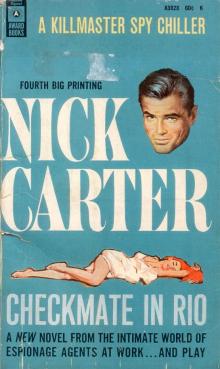 Checkmate in Rio
Checkmate in Rio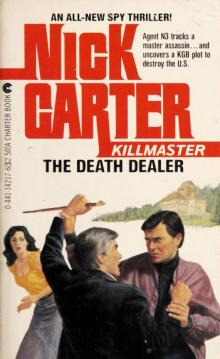 The Death Dealer
The Death Dealer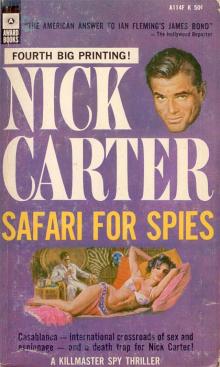 Safari for Spies
Safari for Spies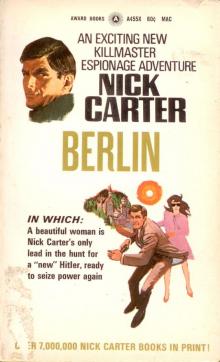 Berlin
Berlin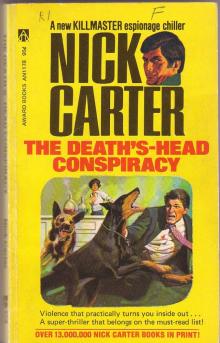 The Death’s Head Conspiracy
The Death’s Head Conspiracy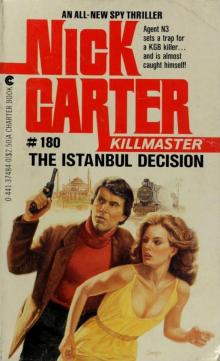 The Istanbul Decision
The Istanbul Decision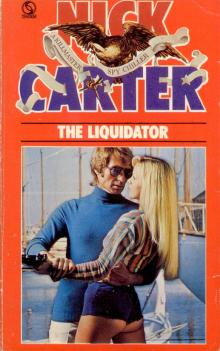 The Liquidator
The Liquidator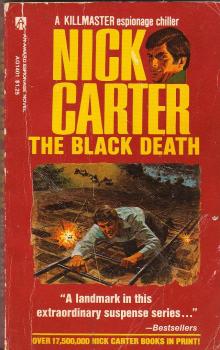 The Black Death
The Black Death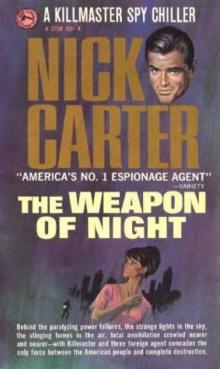 The Weapon of Night
The Weapon of Night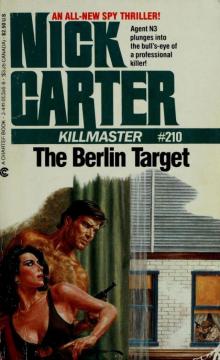 The Berlin Target
The Berlin Target Temple of Fear
Temple of Fear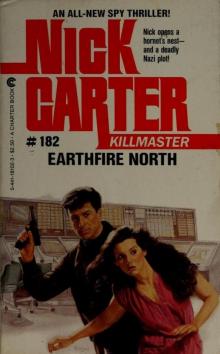 Earthfire North
Earthfire North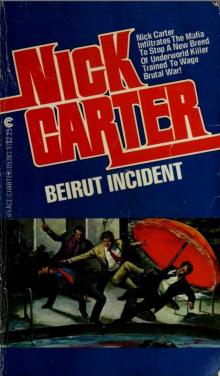 Beirut Incident
Beirut Incident White Death
White Death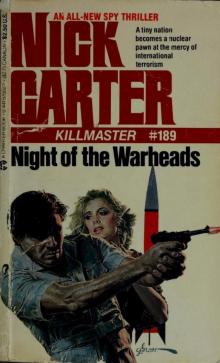 Night of the Warheads
Night of the Warheads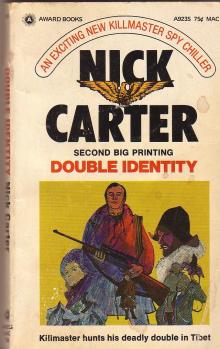 Double Identity
Double Identity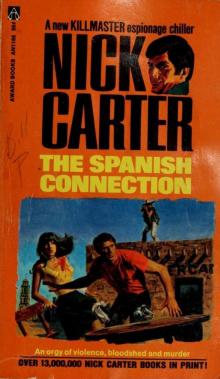 The Spanish Connection
The Spanish Connection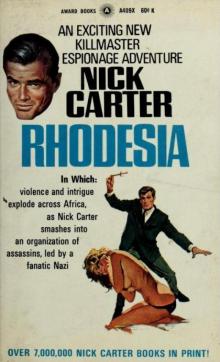 Rhodesia
Rhodesia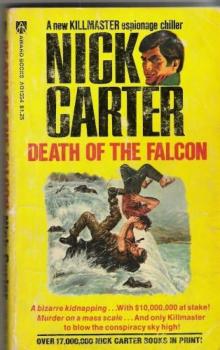 Death of the Falcon
Death of the Falcon The Executioners
The Executioners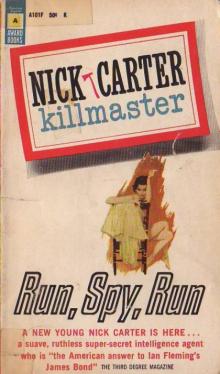 Run, Spy, Run
Run, Spy, Run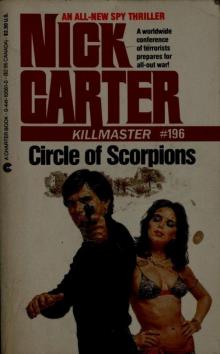 Circle of Scorpions
Circle of Scorpions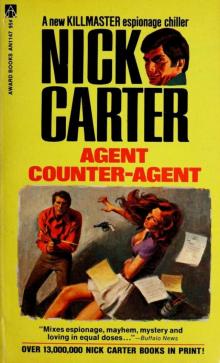 Agent Counter-Agent
Agent Counter-Agent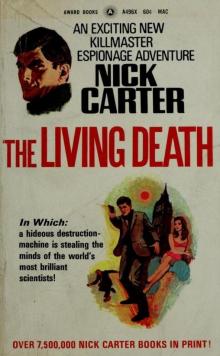 The Living Death
The Living Death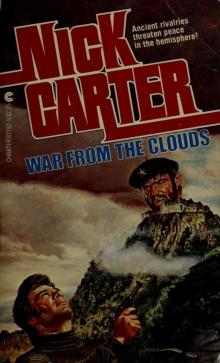 War From The Clouds
War From The Clouds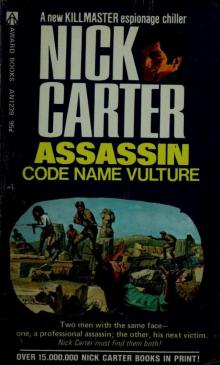 Assassin: Code Name Vulture
Assassin: Code Name Vulture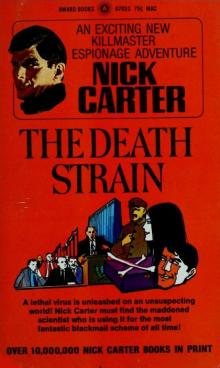 The Death Strain
The Death Strain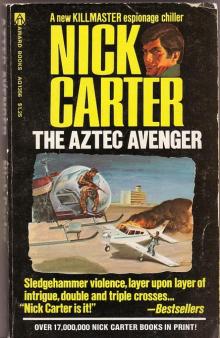 The Aztec Avenger
The Aztec Avenger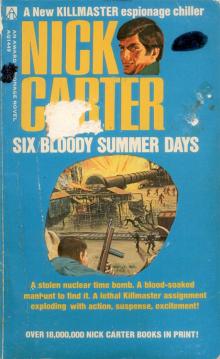 Six Bloody Summer Days
Six Bloody Summer Days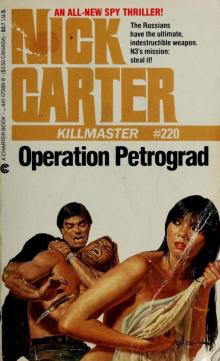 Operation Petrograd
Operation Petrograd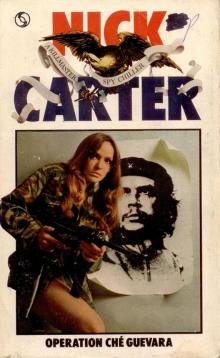 Operation Che Guevara
Operation Che Guevara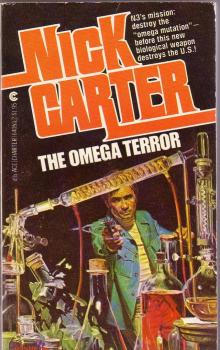 The Omega Terror
The Omega Terror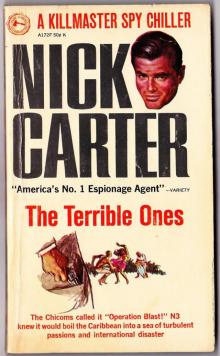 The Terrible Ones
The Terrible Ones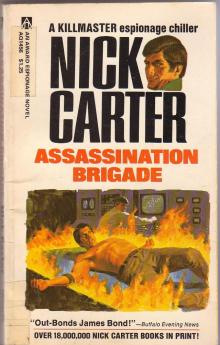 Assassination Brigade
Assassination Brigade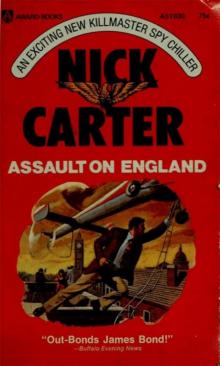 Assault on England
Assault on England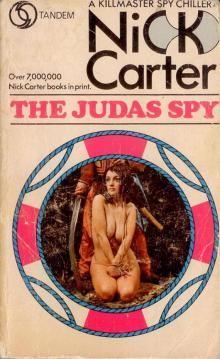 The Judas Spy
The Judas Spy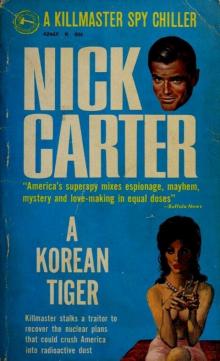 A Korean Tiger
A Korean Tiger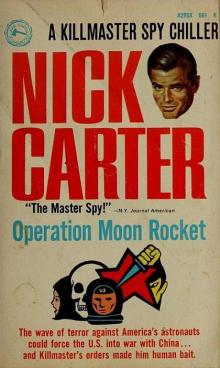 Operation Moon Rocket
Operation Moon Rocket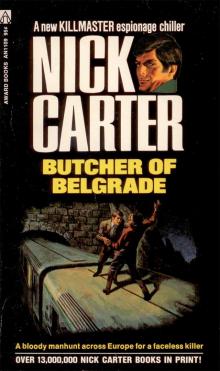 Butcher of Belgrade
Butcher of Belgrade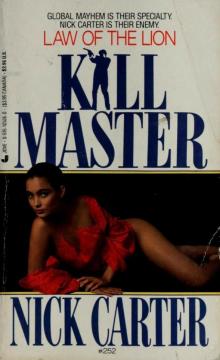 Law of the Lion
Law of the Lion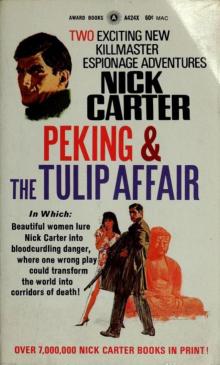 Peking & The Tulip Affair
Peking & The Tulip Affair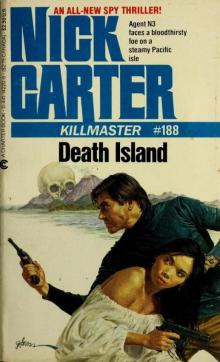 Death Island
Death Island The Jerusalem File
The Jerusalem File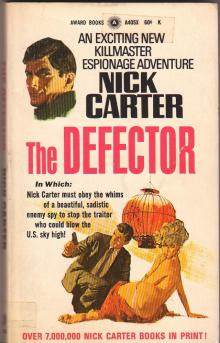 The Defector
The Defector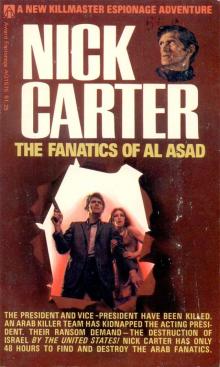 The Fanatics of Al Asad
The Fanatics of Al Asad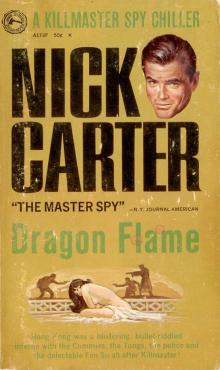 Dragon Flame
Dragon Flame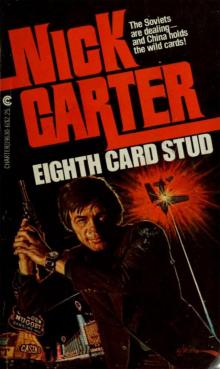 Eighth Card Stud
Eighth Card Stud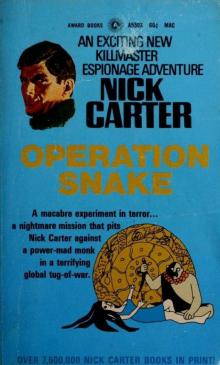 Operation Snake
Operation Snake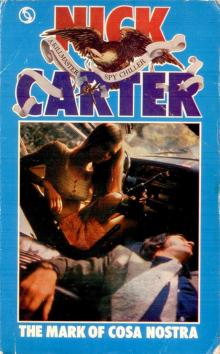 The Mark of Cosa Nostra
The Mark of Cosa Nostra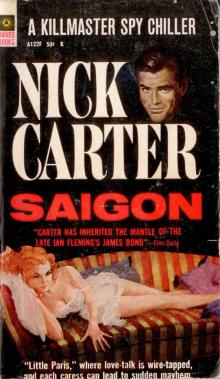 Saigon
Saigon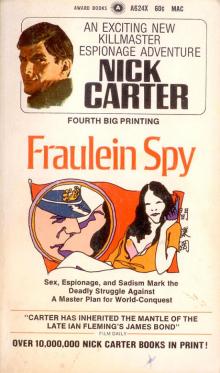 Fraulein Spy
Fraulein Spy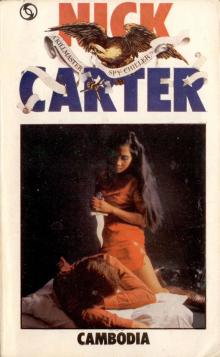 Cambodia
Cambodia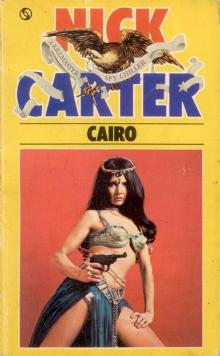 Cairo
Cairo